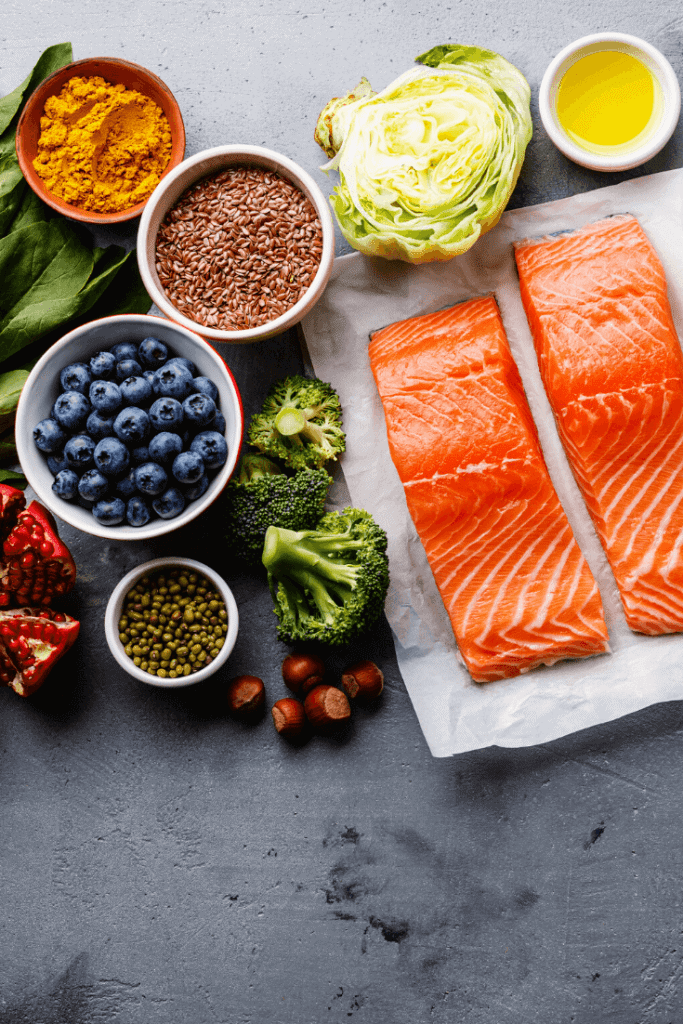
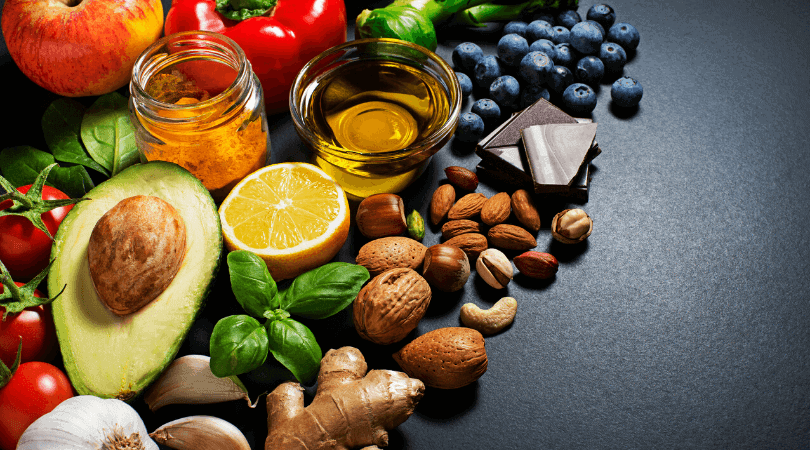
I’ve been wanting to write this post on the foods that fight inflammation for awhile. But, with all the holiday posts, I kept putting it on the back burner.
But, the truth is, it wasn’t just this post on the back burner. My regular eating habits took a back seat, too.
Am I the only one that feels it is almost impossible to eat clean around the holidays?
There’s just constant temptation, plus the lure of traditional and sentimental foods that holiday memories bring.
And, believe me, I am feeling every one of those poor choices.
However, the reality is, my autoimmune diseases don’t take a holiday break.
So, it’s time to get back on track as much as I can and focus on the foods that are going to help me feel better, fight inflammation, and enjoy my whole life – not just what is on the plate.
The Benefits of an Anti-Inflammatory Diet:
If you’re struggling with any health issues at all or even just stubborn weight gain, you are probably experiencing inflammation as well.
One of the most powerful ways you can help your body restore health is through choosing foods that will support your body in getting back into balance by fighting only the inflammation that it should be fighting.
The anti-inflammatory diet offers so many benefits, including:
- can reduce pain and joint swelling
- prevents cardiovascular disease and diabetes
- prevents weight gain and helps with weight loss
- improves brain health
- improves skin and conditions like acne, eczema, psoriasis…
- improves autoimmune disease symptoms
But, the most important reasons to eat an anti-inflammatory diet is that you will feel better, have more energy and think clearly (less brain fog).
We are talking real quality of life, yo.
When paired with powerful supplements that also help the body fight inflammation, you will really start to see overall improvement in how you feel every day.
The Top Foods that Fight Inflammation:
To make it simple (where my visual learners at?), I made you this little infographic with the 15 foods we are going to talk about today!
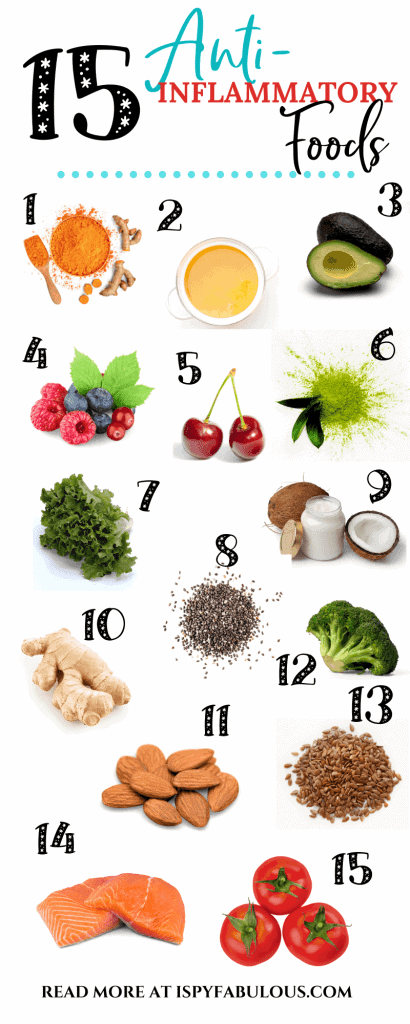
And, I even made you a video with the quick facts on each of these foods. Or, scroll down for more info on why each of these foods is important.
I’d also like to just mention that even though these foods are powerful anti-inflammatories, you may still experience a reaction or have a sensitivity to one of them. Always listen to your body and do what makes you feel better.
1. Health Benefits of Turmeric:

I’ve talked about the power of turmeric before in my post on the anti-inflammatory supplements I take almost every day.
When I first started trying different supplements to help manage the symptoms, turmeric was the first one that I saw real results from and got excited that this could actually help.
The powerhouse in turmeric is curcumin, which when combined with a little black pepper, is a potent anti-inflammatory and antioxidant that can have a powerful effect on your body’s ability to fight infection, reduce inflammation, ease chronic pain and so much more.
While some cultural diets include a lot of turmeric, the traditional American diet does not – so you’ll want to supplement, either with one of these golden milk recipes, in supplement form, or by incorporating it into other recipes.
If you’d like to learn more, here’s my detailed article on all the benefits of turmeric/curcumin.
2. Health Benefits of Bone Broth:



If you’re thinking bone broth is like the stock you use as a base for soups and other recipes, you’re close.
The main difference between bone broth and stock is how long it’s simmered, increasing the amount of nutrients and minerals that are pulled from the bones.
While bone broth has recently become super popular as a remedy for leaky gut syndrome, it’s actually been used for centuries because of its body strengthening and healing properties.
There are many benefits to drinking bone broth, including:
- Heals leaky gut (it’s true!)
- Helps reduce joint pain because of glucosamine
- Restores collagen levels, which strengthen and lubricate joints and can help slow the signs of aging
- Helps strengthen the immune system
- Reduces inflammation
- Aids in muscle recovery, due to amino acids
It’s easy to incorporate bone broth. You can use it as a base for soups or recipes or just drink it straight, like you would with chicken noodle soup.
Personally, I buy it because it’s easier and I am all about the easy lifestyle swaps! My preference is this one by Pacific Foods.
If you’d like to make it, here’s an easy recipe.
3. Health Benefits of Avocados:
Who doesn’t love avocados? Luckily, they’re good for you, too.
Avocados are packed with nutrients and are another great anti-inflammatory food. A single serving offers you vitamin K, folate, vitamin C, potassium, vitamin B5, vitamin B6, vitamin E and small amounts of magnesium, manganese, copper, iron, zinc, phosphorous and vitamins A, B1, B2 and B3 (source).
WOW.
Because of all of those sweet, sweet nutrients, avocados offer great health benefits, such as:
- Oleic acid reduces inflammation
- Fiber helps with regular digestion and reduces stomach inflammation
- Potassium helps reduce blood pressure
- Reduces cholesterol
- Reduces heart attack risk
- Help protect eyes
- Can reduce symptoms of osteoarthritis
If you’d like to read more about the incredible benefits to eating avocados, read this post by Healthline, or you can fast forward to my favorite recipe with avocado – the most delicious avocado toast ever!
4. Health Benefits of Berries:
Berries are delicious and they are some of the best foods you can eat for your health and to reduce inflammation in your body!
They also make excellent ingredients for superfood smoothie recipes!
Berries are effective inflammation fighters because they are loaded with antioxidants that protect your body from free radicals and other things that create inflammation in the body. Like little security sentinels in your body, they actually can turn off the inflammation signals triggered by cytokines and COX-2s.
Here are a few of the berries to amp up in your diet:
- Strawberries: Contain tons of vitamin C and folic acid
- Blueberries: Contain 20 types of anthocyanin (most berries have 3 or 4)
- Cranberries: Battle bacteria known to cause UTIs and other infections, are a natural probiotic and support good bacteria in the gut and digestive system
- Blackberries, Raspberries and Boysenberries: Contain tons of fiber!
I think berries are my favorite anti-inflammatory food to eat. If you’re worried about the sugar content in fruit, just tell yourself they’re fighting all that inflammation in your body.
SCORE.
5. Health Benefits of Cherries:

I remember reading years ago about a study done with tart cherry juice and people who had arthritis. Because of the anthocyanins in tart cherries, drinking or eating tart cherry juice can help reduce inflammation.
Plus, there are other health benefits to them, such as: quicker recovery from workouts, better sleep, helps you lose stubborn abdominal fat, can reduce cancer risk and more.
I started drinking a glass of tart cherry juice at night before bed and while I didn’t see a huge difference, I notice enough of one that I kept drinking it for quite awhile. The taste is, well, tart – but you’ll adjust really quickly.
The Cherribundi brand is the most recommended brand and the one that I used.
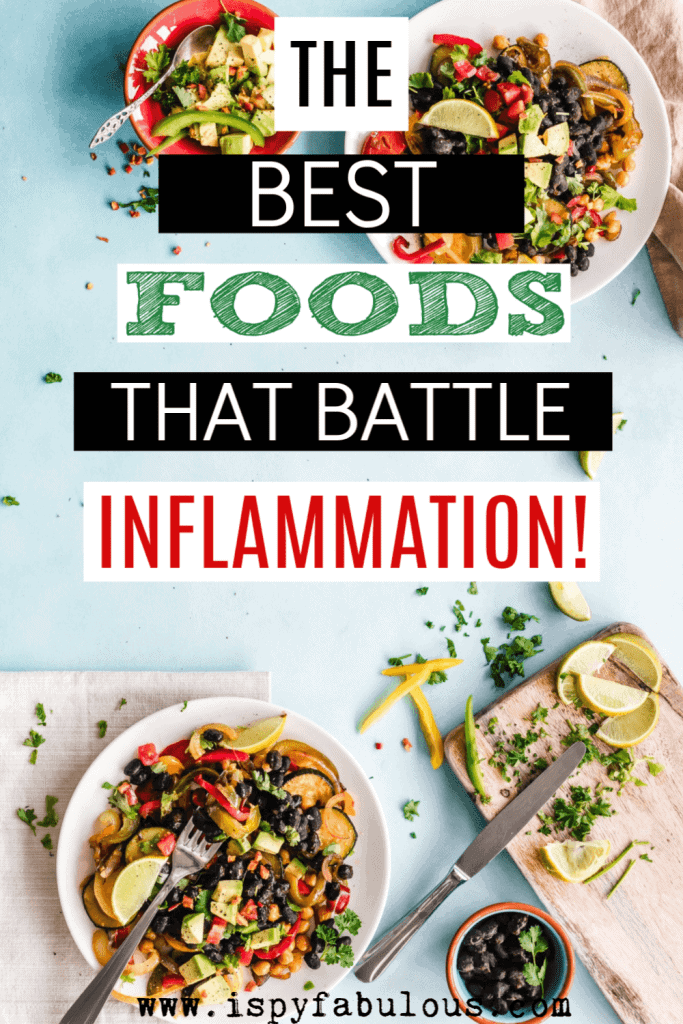
6. Health Benefits of Green Tea:
Have you heard about the many health benefits of green tea yet? I feel like I’m seeing it everywhere now!
Since drinking green tea prevents free radicals from attacking the body, that means it also helps the body guard against infections. This makes green tea perfect for people who have excess inflammation or are on medications (for autoimmune diseases or arthritis) that suppress the immune system.
Plus, “in lab studies, Case Western Reserve University researchers in Cleveland showed EGCG (a substance in green tea) may halt arthritis progression by blocking interleukin-1, a pro-inflammatory cell, from damaging cartilage.” (blog.arthritis.org)
If that’s not enough to excite you, green tea has also been linked with decreasing cholesterol, helping the body fight tumor and cancer growth, can improve bone strength, promote skin healing and and may slow progression of brain diseases, such as Alzheimer’s (source).
7. Health Benefits of Leafy Greens:
While I certainly enjoy a good salad, I’m not a huge fan of the healthiest leafy greens: kale, arugula, chard, and spinach.
So, I shove them in smoothies.
#WINNING
According to Amy Myers M.D., there are 12 incredible health benefits to leafy greens, including:
- Support brain function
- Fight abdominal bloating
- Give you glowing skin
- Help relieve stress
- Support bone health
- Support healthy aging
- Improve inflammatory response
- Balance sugars
- Improve gut health
- Help remove toxins from the body
- Boost digestive enzymes
- Support immune system
I like all those things! You can read more about this in her post here.
8. Health Benefits of Chia Seeds:


Chia seeds are pretty amazing little seeds. You wouldn’t think much just by looking at them, but they are a great example of not judging a book by its cover.
Chia seeds offer plant protein, calcium, fiber, and powerful minerals like magnesium, manganese, and phosphorus. They also contain smaller amounts of important vitamins like B vitamins, potassium and zinc.
All of these nutrients mean that chia seeds are excellent forms of protein, are packed full of important antioxidants, help with bone health and regulating blood sugar levels.
There are so many ways to get chia seeds in your diet. A lot of people like creating overnight chia seed parfaits that make for healthy breakfasts. I don’t like the texture, but I put a spoonful in smoothies and you don’t even taste them!
Here are some more chia seed recipes you can try.
9. Health Benefits of Coconut Oil:
You love coconut oil. I love coconut oil. We ALL LOVE COCONUT OIL!
There are seriously so many ways you can use coconut oil. Just check out this post on the 101 ways to use coconut oil!
Coconut oil is super rich in beneficial fats, with over 50% coming from lauric acid, making coconut oil the richest source of lauric acid after breastmilk. Plus, coconut oil naturally contains MCTs, which can also be bought as a separate supplement. The MCTs in coconut oil are 42% lauric acid, 7% caprylic acid, and 5% capric acid, which are excellent for brain health, immune function, and have antibacterial properties.
Read more about the benefits of coconut oil and how to use it here.
10. Health Benefits of Ginger:
Ginger is another one of the most powerful anti-inflammatory foods on the planet!
Ginger has been used as a natural medicine for centuries because of its healing properties. It can be used fresh, dried, powdered or as an oil and has been used to treat everything from pregnancy nausea to reducing otheoarthritis symptoms.
Because ginger reduces inflammation, it also helps relieve the symptoms that result from inflammation, such as digestive distress, joint pain, and more.
Here are some ways to incorporate ginger in your diet.
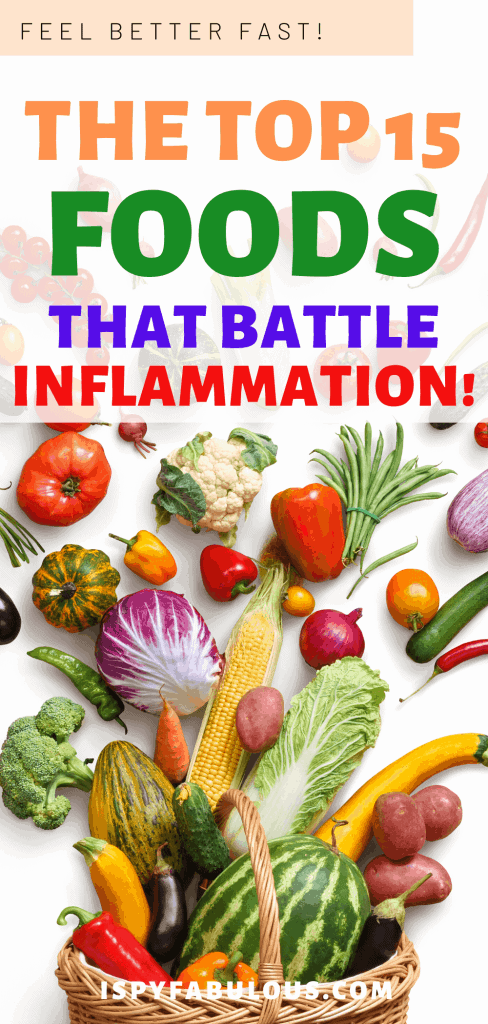
11. Health Benefits of Nuts:
Nuts make an easy and nutritious snack that you can grab and go. Back when I was first trying out natural remedies, I read that brazil nuts are an excellent supplement for selenium, which is primarily found in fresh caught fish. I don’t eat any fish and am allergic to seafood, so I thought this would be a really great way to replace selenium.
Not only that, but nuts contain
Here are the most nutritious types of nuts to consider:
- Almonds
- Hazelnuts
- Pistachios
- Walnuts
- Brazil Nuts
To figure out which ones are right for your nutritional needs, check out this post on the most nutritious nuts and get snackin’!
12. Health Benefits of Broccoli:
How do you feel about broccoli? It’s not my favorite vegetable, but I have learned to appreciate it over the years, because it is such a great vegetable for families and a powerful nutritional source.
Full of vitamin C, K, B1, B2, B3, B6, fiber, folate, iron, magnesium, potassium, and zinc, broccoli is rich in antioxidant that have anti-inflammatory benefits.
Vitamin K is excellent for blood clotting, which is very important, and folate is responsible for cell growth and metabolism – both critical nutrients everyone needs, but particularly women who have, are, or will be, pregnant.
But, it’s the sulforaphane in broccoli that fights inflammation, making it an excellent anti-inflammatory food.
13. Health Benefits of Flax Seeds:
Flax seeds are another popular seed that has become super popular recently. Their nutritional makeup is somewhat similar to chia seeds, but flax seeds win in the omega-3s department.
Plus, due to the high fiber content, they are excellent for digestion – although too much can lead to another issue entirely. Also, some research has shown that the lignans in flax seeds are an anticancer compound. Pretty awesome.
You can eat flax seeds in seed form, or in powder or oil form, making them very easy to incorporate into recipes.
14. Health Benefits of Wild Fish:
I mentioned earlier that I don’t eat fish, but I do appreciate the nutritional value of wild caught fish. They are excellent sources of protein, omega 3 fatty acids, iodine, vitamin D, and more. As one of the healthiest foods on the planet, fish have been shown to have many health benefits like:
- Improve eye health
- Lower heart attack risk
- Support optimal brain function
- Reduce risk of depression
- Reduce inflammation
- Improve sleep quality
If I were going to eat fish, it would be wild caught only, similar to how I only eat free range, hormone free chicken and beef.
Fish offers a unique combination of vitamins and minerals, so if you’re not eating fish, you’ll want to find a way to supplement to prevent nutritional deficiencies.
Here is a fantastic post, much better than I could write on fish, that gives lots of information on the benefits of wild caught fish and how to source it sustainably.
15. Health Benefits of Tomatoes:
I have read some research that says tomatoes are not good for people with autoimmune diseases, because they are a nightshade. Personally, I have not had a negative reaction – but listen to your own body.
Tomatoes are said to be excellent inflammation fighters because they are packed with lycopene, potassium and vitamin C. Lycopene is also known to be excellent for reducing pro-inflammatory compounds in the body and protects against cancer.
Cooking tomatoes in extra virgin olive oil can maximize how many of the nutrients your body absorbs, too, which is great – because I love cooking with EVOO anyway.
Or, turn those tomatoes into one of these salsa recipes. Yum!
****
Wow, that was a lot of info. This post took me weeks to right, so boy am I glad to be here in the final stretch.
The good news is that now you have all of this information handed to you on a silver platter, so you can incorporate more of these foods into your diet and start feeling the benefits of less inflammation and more health and strength.
Do you have a favorite anti-inflammatory food? Let us know in the comments below!
Have a fabulous day,
E






